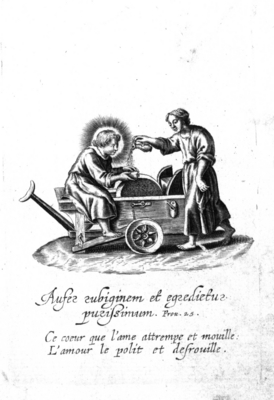Expolitio Amoris [53]

XI.
Iacob.4.1.Cor.5.
Leuit.28.
Vgo.
P. Beroal.
PVrificate corda duplices animo, & expurgate
vetus fermentum vt sitis noua conspersio, quia
fruges terræ cordis vestri consumet rubigo. Aufer
igitur rubiginemècorde meo, o Amor, rubigi-
nem inquam vanitatis, falsitatis & superfluitatis,
rubiginem superbiæ, auaritiæ, luxuriæ, rubiginem
inuidiæ, & iræ, rubiginem gulæ, & acediæ. væci-
uitati sanguinum, ollæ cuius rubigo in eâ est, &
rubigo eius non exiuit ex ea.
Amor à nobis omnem rusticitatem amolitur,
omnis elegantiæ, omniumque munditiarum pa-
ter est. venustè Plautinus senex, Amorem, Deum
appellat munditiantem, eumque nitidis nitoribus
ait antecellere: da mihi hominem efferum atque
truculentum; hunc amor euestigiò mollem reddit
& mansuetum: da rudem & rusticanum; statim
ab amore fiet ingeniosus & vrbanus. Da Incul-
tum, ab amore cultissimus efficietur: denique se-
gnities omnis, somnus lethargicus, marcor, squa-
lor, incuria, ab amore eliminantur; à quo indu-
stria, nauitas, vigilantia, solertia, cultus & nitor
promanant.
PVrificate corda duplices animo, & expurgate
vetus fermentum vt sitis noua conspersio, quia
fruges terræ cordis vestri consumet rubigo. Aufer
igitur rubiginemècorde meo, o Amor, rubigi-
nem inquam vanitatis, falsitatis & superfluitatis,
rubiginem superbiæ, auaritiæ, luxuriæ, rubiginem
inuidiæ, & iræ, rubiginem gulæ, & acediæ. væci-
uitati sanguinum, ollæ cuius rubigo in eâ est, &
rubigo eius non exiuit ex ea.
Amor à nobis omnem rusticitatem amolitur,
omnis elegantiæ, omniumque munditiarum pa-
ter est. venustè Plautinus senex, Amorem, Deum
appellat munditiantem, eumque nitidis nitoribus
ait antecellere: da mihi hominem efferum atque
truculentum; hunc amor euestigiò mollem reddit
& mansuetum: da rudem & rusticanum; statim
ab amore fiet ingeniosus & vrbanus. Da Incul-
tum, ab amore cultissimus efficietur: denique se-
gnities omnis, somnus lethargicus, marcor, squa-
lor, incuria, ab amore eliminantur; à quo indu-
stria, nauitas, vigilantia, solertia, cultus & nitor
promanant.

Polissure de l'Amour.
XI.
Pourquoy l'Amour aiguise t'il sans fin?
C'est que le cœur n'est iamais assés fin:
Pour delaçer les nœuds, de ses filets;
Si c'est cela, croyes, qu' il perd sa paine:
C'est un abus, c'est une atteinte vaine,
(En estant prins) de sortir de ces rets.
XI.
Pourquoy l'Amour aiguise t'il sans fin?
C'est que le cœur n'est iamais assés fin:
Pour delaçer les nœuds, de ses filets;
Si c'est cela, croyes, qu' il perd sa paine:
C'est un abus, c'est une atteinte vaine,
(En estant prins) de sortir de ces rets.
Translations
 |
The polishing of love. |
 |
You deceitful of mind, purify your hearts and purge the old ferment, so that you thirst for new aspersion, because the rust
of your heart is destroying the fruits of the earth. Take away, therefore, the rust from my heart, o love, I mean the rust
of vanity, falsehood and indifference, the rust of pride, of decadence, of envy, and of anger, the rust of gluttony, and of
negligence. Woe, citizenship of bloods ???, of the vessel on which there is rust -- and its rust did not go away from it.
Love does away with all our coarseness, it is the father of all taste, of all refinement. The old man in Plautus in a charming
way calls Amor "god the refiner" and says that he is "superior in shining sheen".2 Give me a man who is beastly and unpleasant. Love immediately softens him and makes him meek. Give me one who is uncouth
and provincial. Because of love he will become pleasant and polite. Give me the uncultured, by love he will be made most civilised.
Finally, all torpor, lethargic sleep, decay, filth, neglect are done away with by love. From it industry, goodness, alertness,
cleverness, culture and brilliance flow forth. |
 |
Take away the rust and it will emerge utterly pure.3 |
Literature
Sources and parallels
-
Possibly based on, not mirrored, slight difference in the spelling of motto (Expoliatio/Expolitio), in: Expoliatio amoris. [25] (in: anonymous, Amoris divini et humani antipathia (1628))
[Compare
![Compare [compare]](/static/images/compare2.gif) ]
]
-
Same copperplate, slightly altered, in: De liefde reinigt [7] (in: Willem den Elger, Zinne-beelden der liefde (1703))
[Compare
![Compare [compare]](/static/images/compare2.gif) ]
]
-
Grindstone, in:Dat, nec habet. [25] (in: Jacob Cats, Proteus (1618))
[Compare
![Compare [compare]](/static/images/compare2.gif) ]
]
References, across this site, to this page:
- Expoliatio amoris. [25] (in: anonymous, Amoris divini et humani antipathia (1628))
- Dat, nec habet. [25] (in: Jacob Cats, Proteus (1618))
- De liefde reinigt [7] (in: Willem den Elger, Zinne-beelden der liefde (1703))
Iconclass
Sacred love is holding a heart against a grindstone while the soul is pouring water over it- God's perfections
[11A23]

- water (one of the four elements)
[21D]

- radiance emanating from persons or things
[22C31]

- heart
[31A2221]

- sitting on an elevation
[31A2352]

- adult woman
[31D15]

- the soul during lifetime
[31G1]

- container of metal: bucket, can, canister, drum, tin
[41A771]

- polishing (industrial process)
[47C511]

- sharpening, grinding (industrial processes)
[47C55]

- pouring (industrial process)
[47C611]

- machine driven by human or animal power
[47D2]

- tools, aids, implements ~ crafts and industries: grindstone
[47D8(GRINDSTONE)]

- Imperfection, Incompleteness; 'Imperfettione' (Ripa) (+ emblematical representation of concept)
[51AA7(+4)]

- Completion (+ emblematical representation of concept)
[54D3(+4)]

- (personifications and symbolic representations of) Love; 'Amore (secondo Seneca)' (Ripa) (+ clothed)
[56F2(+123)]

- (personifications and symbolic representations of) Love; 'Amore (secondo Seneca)' (Ripa) (+ emblematical representation of
concept)
[56F2(+4)]

- proverbs, sayings, etc. (with TEXT)
[86(EXPOLITIO AMORIS)]

![[H O M E : Emblem Project Utrecht]](/static/images/rd-small.gif)




































































































